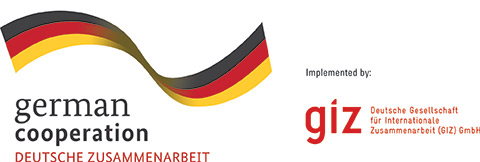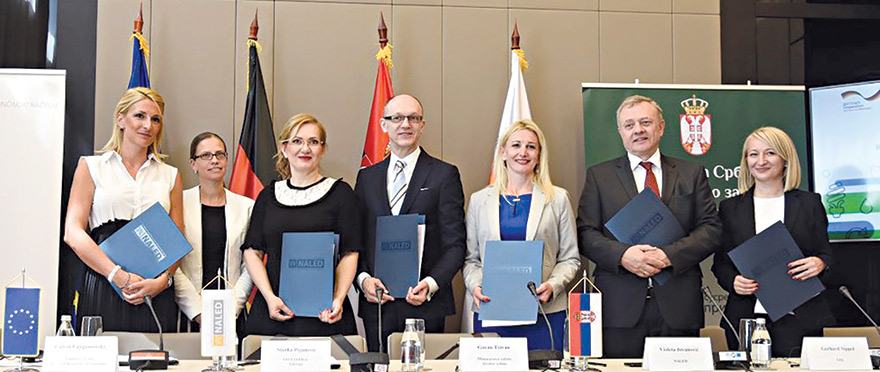German Development Cooperation, through its development partnership mechanism and the develoPPP.de programme, combines forces with companies with the aim of responding jointly to the biggest challenges, most notably the challenges of achieving the Sustainable Development Goals (SDGs)
Issues related to environmental protection are similar if not the same in all Western Balkan countries, so joint efforts through cooperation and exchanges of experience and solutions are not only useful but rather essential. CorD’s interlocutor is Zorica Bilić, Country Coordinator, Open Regional Funds for Southeast Europe – Modernisation of Municipal Services, GIZ GmbH.
German Development Cooperation aimed at supporting sustainable development has for many years encouraged the inclusion of the private sector in the implementation of joint projects. What are developing partnerships with the private sector like and how are they implemented?
– Considering that there can be no sustainable development without the involvement of the private sector, German Development Cooperation, through its development partnership mechanism and the develoPPP.de programme, combines forces with companies with the aim of responding jointly to the greatest challenges, primarily challenges in achieving the Sustainable Development Goals.

Sustainable business initiatives are thus jointly funded and implemented, which, in addition to commercial goals for companies, also brings long-term benefits to the local populations in developing countries.
Through this mechanism, the economy can find a strong partner in projects that are implemented by GIZ, on behalf of the German Federal Ministry for Economic Cooperation and Development (BMZ), whether bilateral projects implemented in Serbia or regional projects at the level of Southeast Europe, such as the Open Regional Fund for the Modernisation of Municipal Services – ORF MMS.
How much space in such projects is taken up by environmental protection? Will this area be increasingly important at the global level in the coming years?
– Our experience shows that the largest number of development partnerships in Serbia and the region relate specifically to environmental protection, while this topic holds a high third place globally, immediately behind economic development and agriculture. This shows that businesses operating in this part of Europe are increasingly seeing their development opportunity and business success in so-called green projects. From the aspect of development cooperation, reforms that lead to environmental sustainability, such as rational use of natural resources and adequate waste management, certainly comprise the biggest contributors to sustainable development goals.
It was also through this mechanism that the recently completed project “Towards Better E-Waste Management in Serbia” was implemented. How satisfied are you with the results you’ve achieved?
– In cooperation with companies Gorenje and Coca Cola HBC, in the past two and a half years we’ve implemented a project aimed at improving the framework conditions, including the legal and institutional framework, as well as raising awareness for the management of electrical and electronic waste.

Thanks to a partnership with the Ministry of the Environment, the Environmental Protection Agency and the National Alliance for Local Economic Development (NALED), the collection and analysis of data on streams of this waste has been improved significantly, as has the collection of eco-taxes through a more transparent and efficient process and the use of digital solutions in conducting procedures.
As the fastest-growing category of waste in the world, there is still a lot that needs to be improved, especially with regard to adequate disposal and recycling, but I think that all project partners can be satisfied with the basis that has been established through this project.
What is the situation with other waste streams? What projects are active at present and how important to their implementation is the development partnership with the private sector?
– Thanks first and foremost to the good experience on the project “Towards Better E-Waste Management”, but also the great interest of companies in this field, German Development Cooperation, through GIZ ORF MMS, has been able to initiate the solving of problems of various waste streams in Serbia and the region in the previous period.
Under conditions of the Covid-19 pandemic, the most important aspect for GIZ is the health of the employees, and providing support to the healthcare systems in all countries where we work
Some of the projects we are implementing include addressing food waste issues in partnership with EsoTron company, then increasing the rates of recycling for batteries and light bulbs, in partnership with companies Božić i sinovi and E-reciklaža, as well as managing glass packaging waste that we carry out together with companies Sekopak in Serbia, Ekopak from Bosnia and Herzegovina and Pakomak from North Macedonia.
These projects also include regional cooperation between Serbia and other Western Balkan countries. Is it improving year on year? Are we making progress?
– Regional dialogue and cooperation are certainly very important for the realisation of these projects. Environmental protection concerns are similar, if not the same, in all Western Balkan countries, and joint efforts through cooperation and exchanges of experience and solutions are not only useful but rather essential. All parties are undoubtedly aware of this, judging by their openness to cooperation and the increasing number of projects being implemented in this way. Cooperation also takes place between companies and institutions and, of course, civil society organisations.
What role is played in such projects by the civil sector and civil society organisations?
– As without the private sector, sustainable development is not possible without civil society organisations. They are an indispensable and key partner for us. We wouldn’t be able to realise the majority of these projects if NALED and the Network for business-friendly environment BFC SEE weren’t engaged in the front row, working on generating ideas and developing projects, but also bearing the greatest burden on realisation.
Who can get involved in these projects? Are there currently open invitations for companies to join developmental partnerships?
– The Call for the develoPPP.de programme is open year-round, with projects submitted quarterly. EU-based companies can apply for support through the mechanism of development partnerships with the private sector, but also, as of more recently, domestic companies too. In addition to its regularly open call, through this programme, BMZ is currently supporting measures from private companies that alleviate the negative impact of the coronavirus pandemic in developing countries. Private companies can apply for such projects at any time until 30th September this year.
To what extent has Covid-19 influenced your current operations and functioning? Are you considering adjusting the plans you had for this year?
– Like GIZ globally, the Open Regional Fund for the Modernisation of Municipal Services also continues to work with together our partners during the pandemic, but with approaches adapted to the current situation. In cooperation with our partners, we adapt plans and activities within the scope of all the projects that we’re implementing. Unusual circumstances require us to adopt new ways of working, and digital technologies and creative concepts help us to cope with these challenging conditions. Certainly the most important aspect in the health of our employees and providing support to the healthcare systems in all countries where we work.